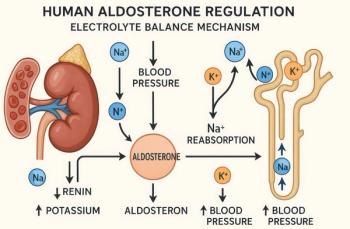
A Change of Heart on β-Blocker Therapy
Are beta-blockers still considered first-line therapy for uncomplicated hypertension?
Q: Are β-blockers still considered first-line therapy for uncomplicated hypertension?
A: These agents were originally developed to treat coronary heart disease (CHD), and subsequent trials confirmed their value in patients who had sustained a myocardial infarction (MI), in those with angina pectoris and, more recently, in those with congestive heart failure (CHF). Because of their effectiveness for secondary prevention of CHD, it was assumed that they would also be effective for primary prevention in patients with uncomplicated hypertension.
Over the past 3 decades, β-blockers were widely prescribed and frequently served as reference agents in hypertension clinical trials. Although the effectiveness of these agents in lowering blood pressure was recognized, it was unclear whether they could effectively prevent MI and stroke. This concern arose in 1985, when a study of more than 17,000 patients with mild hypertension found that propranolol did not reduce the overall rate of coronary events.1 More recently, the effectiveness of β-blockers has been challenged by Messerli and colleagues2,3; yet these agents have remained popular and are recommended in several guidelines for the management of uncomplicated hypertension.
In 2004, Carlberg and colleagues4 published a meta-analysis of 9 randomized controlled trials that assessed the effects of atenolol on cardiovascular morbidity and mortality in patients with primary hypertension. Although atenolol lowered blood pressure in all the trials, overall risk of MI and other outcomes was not affected. In 4 of the trials, atenolol was compared with placebo and with no treatment. The groups did not differ significantly in incidence of MI, stroke, cardiovascular mortality, or all-cause mortality. In 5 of the trials, atenolol was compared with other antihypertensives, including diuretics, captopril, losartan, and lacidipine. The rates of stroke and cardiovascular and all-cause mortality were highest in the atenolol group. There was no significant difference in the incidence of MI. The authors of the meta-analysis questioned the appropriateness of atenolol in the treatment of uncomplicated hypertension as well as its use as a reference drug in hypertension outcome trials.
Recently, the same authors5 published an expanded meta-analysis that included substantially more data on atenolol and other β-blockers, including oxprenolol, metoprolol, propranolol, and pindolol. β-Blockers were compared with other antihypertensives in 13 randomized controlled trials that enrolled almost 106,000 patients. The relative risk of stroke was 16% higher in the β-blocker group. The relative risk of all-cause mortality was also slightly higher in this group, although there was no difference in the rate of MI.
In 7 other studies, which involved 27,400 patients, β-blocker therapy was compared with placebo and no treatment. The risk of stroke was 19% lower in the β-blocker group, about half the risk reduction seen in many earlier clinical trials that involved β-blockers and diuretics. No differences were noted for MI or all-cause mortality.
The authors concluded that β-blockers are less effective than other antihypertensives and are associated with an elevated risk of stroke. They recommended that β-blockers not be considered first-line therapy for primary or uncomplicated hypertension and that they not be used as reference drugs in future trials of antihypertensives.
Additional concerns have been expressed following a host of recent clinical trials suggesting that β-blockers may be associated with an increased risk of type 2 diabetes. Researchers observed that diabetes developed at a higher rate in patients treated with β-blockers and thiazide diuretics than in those treated with angiotensin II receptor blockers (ARBs). It remains to be determined whether the differences relate to the β-blocker/diuretic combination or to the preventive effect of ARBs.
The bottom line. In view of the poor performance of β-blockers compared with other antihypertensives in patients with uncomplicated hypertension, it seems appropriate to consider a change in medication for such patients who are being treated with β-blocker monotherapy. Most hypertensive patients without heart disease can be safely switched to antihypertensives in other classes.
Sudden discontinuation, especially from higher doses of a β-blocker, is not recommended because it might lead to rebound angina pectoris or precipitate an MI in patients with overt or undiagnosed CHD. In these patients, a slow step-down and discontinuation are appropriate before the initiation of an agent from another class. Other patients-such as those with anxiety or hyperadrenergic states-may continue to benefit from β-blocker therapy, which often provides symptomatic relief as well as an antihypertensive effect.
β-Blockers are still clearly indicated in patients with established CHD, angina pectoris, or CHF, and they continue to be especially valuable for the control of heart rate in patients with tachyarrhythmias, particularly atrial fibrillation. Furthermore, the above comments do not apply to the newer β-blockers, such as carvedilol and nebivolol, which also have vasodilating properties. These agents have not been studied in long-term outcome trials of treatment for uncomplicated hypertension and it is unlikely that they will ever be included in such trials.
References:
REFERENCES:
1.
Medical Research Council Working Party. MRC trial of treatment of mild hypertension: principal results.
Br Med J (Clin Res Ed).
1985;291:97-104.
2.
Messerli FH, Grossman E, Goldbourt U. Are β-blockers efficacious as first-line therapy for hypertension in the elderly? A systematic review.
JAMA.
1998; 279:1903-1907.
3.
Messerli FH, Beevers DG, Franklin SS, Pickering TG. β-Blockers in hypertension-the emperor has no clothes: an open letter to present and prospective drafters of new guidelines for the treatment of hypertension.
Am J Hypertens.
2003;16:870-873.
4.
Carlberg B, Samuelsson O, Lindholm LH. Atenolol in hypertension: is it a wise choice?
Lancet.
2004; 364:1684-1689.
5.
Lindholm LH, Carlberg B, Samuelsson O. Should beta blockers remain first choice in the treatment of primary hypertension? A meta-analysis.
Lancet.
2005;366:1545-1553.
Newsletter
Enhance your clinical practice with the Patient Care newsletter, offering the latest evidence-based guidelines, diagnostic insights, and treatment strategies for primary care physicians.

































































































































